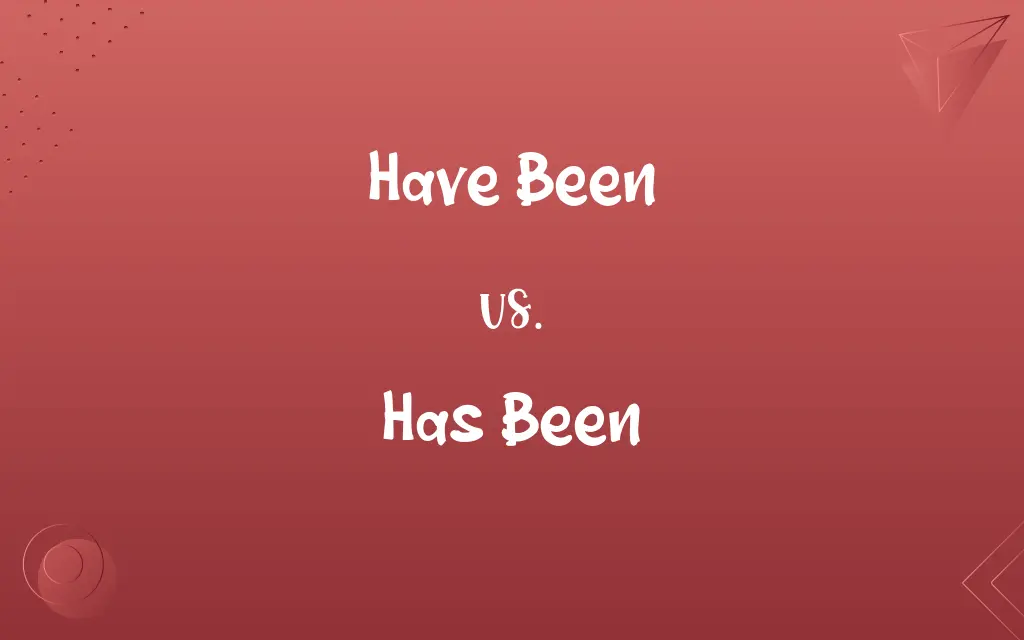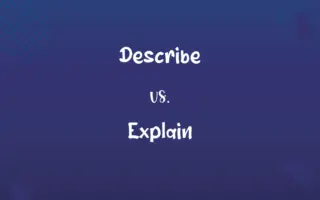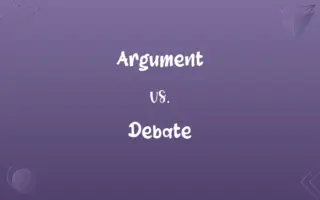Have Been vs. Has Been: Know the Difference

By Shumaila Saeed || Published on January 9, 2024
"Have been" is used with "I, you, we, they" for actions/situations in the past, ongoing or completed; "Has been" is for "he, she, it" in similar contexts.

Key Differences
"Have been" and "Has been" are forms of the verb "to be" in the present perfect tense. "Have been" is used with plural subjects like "we," "you," or "they," while "Has been" is used with singular third-person subjects like "he," "she," or "it." Both indicate actions or states that started in the past and may continue into the present.
Shumaila Saeed
Jan 09, 2024
In the context of time, "Have been" suggests a duration or multiple instances involving the subjects "I," "you," "we," or "they." Conversely, "Has been" refers to a similar duration or occurrences but pertains to "he," "she," or "it." Both forms imply a connection between past and present.
Shumaila Saeed
Jan 09, 2024
"Have been" can express experiences or changes over time for plural or second-person subjects. On the other hand, "Has been" conveys the same for singular, third-person subjects. They both are used to describe events that have relevance to the present.
Shumaila Saeed
Jan 09, 2024
When talking about travel or locations, "Have been" might describe places visited by "I," "you," "we," or "they." In contrast, "Has been" would be used for places visited by "he," "she," or "it." Both forms link the past travels to the present context.
Shumaila Saeed
Jan 09, 2024
In passive constructions, "Have been" and "Has been" are similarly distinguished by subject number and person. "Have been" might describe actions done to "I," "you," "we," or "they," while "Has been" refers to actions done to "he," "she," or "it."
Shumaila Saeed
Jan 09, 2024
ADVERTISEMENT
Comparison Chart
ADVERTISEMENT
Have Been and Has Been Definitions
Have Been
Indicates past to present action for "I, you, we, they."
I have been studying all day.
Shumaila Saeed
Dec 25, 2023
Has Been
Expresses experience or change over time for singular subjects.
He has been living here for years.
Shumaila Saeed
Dec 25, 2023
Have Been
Expresses experience or change over time.
We have been traveling since May.
Shumaila Saeed
Dec 25, 2023
Has Been
Shows repeated actions or habits in the past for singular subjects.
It has been happening frequently.
Shumaila Saeed
Dec 25, 2023
Have Been
Used in passive voice for plural/second-person subjects.
You have been selected for the team.
Shumaila Saeed
Dec 25, 2023
ADVERTISEMENT
Has Been
Describes locations visited in the past by singular subjects.
She has been to London twice.
Shumaila Saeed
Dec 25, 2023
Have Been
Describes locations visited in the past.
I have been to New York several times.
Shumaila Saeed
Dec 25, 2023
Has Been
Indicates past to present action for "he, she, it."
She has been working since morning.
Shumaila Saeed
Dec 25, 2023
Have Been
Shows repeated actions or habits in the past.
They have been visiting us annually.
Shumaila Saeed
Dec 25, 2023
Has Been
Used in passive voice for singular third-person subjects.
He has been given a chance.
Shumaila Saeed
Dec 25, 2023
Has Been
(pejorative) A person, especially one formerly popular or influential, who continues in their field after their popularity or effectiveness has peaked and is now in decline.
Shumaila Saeed
Dec 13, 2023
Repeatedly Asked Queries
Is the use of "Have been" or "Has been" limited to specific times?
They refer to actions or states from the past extending to the present, not limited to specific times.
Shumaila Saeed
Jan 09, 2024
Can "Have been" and "Has been" be used in passive sentences?
Yes, they are often used in the passive voice.
Shumaila Saeed
Jan 09, 2024
How do "Have been" and "Has been" differ in the context of travel?
"Have been" describes places visited by "I, you, we, they," while "Has been" is for "he, she, it."
Shumaila Saeed
Jan 09, 2024
Are there any differences in the negative forms of "Have been" and "Has been"?
The only difference is in subject agreement: "haven't been" for "I, you, we, they," and "hasn't been" for "he, she, it."
Shumaila Saeed
Jan 09, 2024
Is there a difference in formality between "Have been" and "Has been"?
No, there is no difference in formality.
Shumaila Saeed
Jan 09, 2024
How do "Have been" and "Has been" function in terms of duration?
They both can indicate duration from past to present.
Shumaila Saeed
Jan 09, 2024
Can "Have been" and "Has been" be followed by any verb form?
They are usually followed by a past participle.
Shumaila Saeed
Jan 09, 2024
Can "Have been" and "Has been" indicate habitual actions?
Yes, they can indicate actions repeated over time.
Shumaila Saeed
Jan 09, 2024
How does context affect the use of "Have been" and "Has been"?
Context determines whether they refer to actions, experiences, states, or locations.
Shumaila Saeed
Jan 09, 2024
Do "Have been" and "Has been" imply a completed action?
Not necessarily; they can imply ongoing or completed actions.
Shumaila Saeed
Jan 09, 2024
Are "Have been" and "Has been" used differently in American and British English?
No, their usage is generally the same in both varieties of English.
Shumaila Saeed
Jan 09, 2024
Can "Have been" and "Has been" indicate a single occurrence or multiple occurrences?
They can indicate both single and multiple occurrences.
Shumaila Saeed
Jan 09, 2024
Can "Have been" and "Has been" be used in questions?
Yes, they are commonly used in questions about past experiences or ongoing states.
Shumaila Saeed
Jan 09, 2024
Is it correct to use "Have been" and "Has been" for future events?
Typically, they are not used for future events.
Shumaila Saeed
Jan 09, 2024
How do "Have been" and "Has been" interact with adverbs of time?
Adverbs of time can specify the duration or frequency of the action or state.
Shumaila Saeed
Jan 09, 2024
Can "Have been" and "Has been" be used to express feelings or states of being?
Yes, they can describe emotional or physical states over time.
Shumaila Saeed
Jan 09, 2024
How does the meaning change when adding "never" before "Have been" or "Has been"?
"Never" negates the experience or action, indicating it has never occurred.
Shumaila Saeed
Jan 09, 2024
Can "Have been" and "Has been" be used interchangeably with simple past tense verbs?
No, as they imply a connection to the present, unlike simple past tense verbs.
Shumaila Saeed
Jan 09, 2024
Share this page
Link for your blog / website
HTML
Link to share via messenger
About Author
Written by
Shumaila SaeedShumaila Saeed, an expert content creator with 6 years of experience, specializes in distilling complex topics into easily digestible comparisons, shining a light on the nuances that both inform and educate readers with clarity and accuracy.









































































